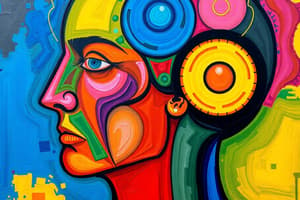Podcast
Questions and Answers
Which of the following is a key characteristic of philosophy?
Which of the following is a key characteristic of philosophy?
- Open-minded and tolerant (correct)
- Merely reading texts
- Rejecting different perspectives
- Avoiding critical analysis
Philosophers aim to establish inconsistent principles to guide living.
Philosophers aim to establish inconsistent principles to guide living.
False (B)
What does philosophy seek to combine for a comprehensive view of the world?
What does philosophy seek to combine for a comprehensive view of the world?
Scientific insights and human experiences
What is one purpose of logical analysis in philosophy?
What is one purpose of logical analysis in philosophy?
Philosophy in the 20th century gained support due to linguistic analysis.
Philosophy in the 20th century gained support due to linguistic analysis.
According to Vincent Barry, what is the philosophical enterprise?
According to Vincent Barry, what is the philosophical enterprise?
What are the two sides of philosophy as described in the content?
What are the two sides of philosophy as described in the content?
Philosophy is defined as a pursuit of _____ by questioning and seeking truth.
Philosophy is defined as a pursuit of _____ by questioning and seeking truth.
What does having a philosophy entail?
What does having a philosophy entail?
Flashcards are hidden until you start studying
Study Notes
Key Characteristics of Philosophy
- Philosophers are open-minded, considering all sides of issues without bias.
- Philosophy involves more than just reading, it requires critical analysis and generalization.
- Philosophers must critically evaluate facts and information, realizing that knowledge doesn't automatically mean understanding.
- Disagreements arise among philosophers because of different perspectives and assumptions. This is common in a constantly changing world.
Philosophy and the Human Experience
- Humans respond to change in various ways, some embrace it and others cling to tradition. Philosophy recognizes both approaches.
- Philosophy addresses areas where knowledge is incomplete.
- Philosophers strive to establish consistent principles to guide living.
Philosophy's Scope
- Philosophy aims to provide a holistic understanding of the world, merging scientific knowledge with human experiences.
- It attempts to create a consistent worldview.
- Achieving a consistent worldview is difficult, yet limiting philosophical inquiry to small parts of human experience is equally problematic.
- Philosophy seeks to connect diverse fields of study for a comprehensive understanding of human existence.
Philosophy and Language
- Philosophy uses logical analysis to clarify the meaning of words and concepts.
- Philosophers dissect language to ensure accurate word usage and to understand their meanings within different contexts and circumstances.
- Some believe that philosophy's central purpose is to analyze language.
- Philosophy can assist other disciplines in their efforts to understand and clarify specific terms or issues.
Contemporary Perspectives (Twentieth Century)
- Linguistic analysis gained prominence in the 20th century, supporting the idea that ethical knowledge stems from personal experiences, logic, and reason.
- Some linguistic analysts interpret knowledge more narrowly than others.
- Contemporary philosophy aims to clarify confusing situations and the meaning of words in various fields and everyday life.
Philosophy as a Pursuit of Wisdom
- Philosophy, as a pursuit of wisdom, is about developing critical thinking habits, continuously seeking truth, and questioning the apparent.
- Questioning the obvious helps us engage with the world in new ways, move beyond common understanding, and speculate about things that others take for granted.
- Raising the appropriate question is often considered the foundation and essence of philosophy.
Key Features of Philosophy
- "Having a philosophy" refers to an informal, personal attitude.
- "Doing philosophy" refers to a process of reflecting and critiquing deeply held beliefs.
- These two senses are intertwined and cannot be separated.
- Simply having a philosophy is not enough for doing philosophy, a genuine philosophical attitude is critical and searching.
The Philosophical Enterprise
- Vincent Barry defines philosophy as an active, imaginative process involving forming questions and answering them through persistent analysis.
- Philosophy has two sides: the constructive side, aiming to formulate rational answers to fundamental questions, and the critical side, focusing on evaluating existing answers.
- Philosophizing is an activity, not a subject learned in schools.
- A great philosopher is not defined by their philosophical products, but by their exceptional ability to engage in philosophical thinking.
Studying That Suits You
Use AI to generate personalized quizzes and flashcards to suit your learning preferences.




